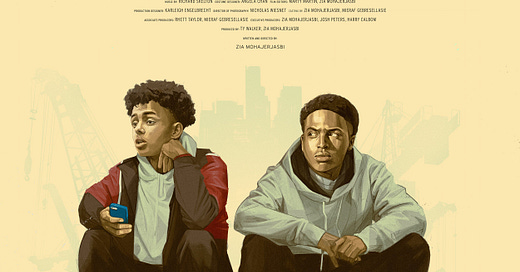First off, they use all lowercase letters for the title know your place, like me on X (formerly Twitter), or bell hooks in longform texts. I interpret this is as a sign of confidence from Writer-Director Zia Mohajerjasbi. Mohajerjasbi is a Persian-American of Seattle, pearl of the Pacific Northwest, who is now a decade-deep into Habesha (specifically Eritrean in this immediate context) filmmaking and community building. I wonder if Mohajerjasbi knows that the Persian Apostle of Light and Supreme Illuminator Mani called Persia and Aksum two of the four great empires of the world in the 3rd Century Anno Domini?
I met him briefly this past Monday at a showing followed by a Q & A MCd by one of my favorite emcees growing up Gabriel Teodros (lovework and Ethiopium: A Jitter Generation Mixtape), in downtown Seattle’s historic SIFF Cinema Egyptian. Gabriel’s friends and frequent collaborators Meklit Hadero and Burntface (my baba’s nametwin Ellias, spelled differently because of course we don’t fuck with standardized spellings of government names) joined Aida Solomon and I at our inaugural Habesha LA day-party at the 2014 ESFNA in San Jose. Anyhoo, I enjoyed know your place with my Eritrean wife, and Ethiopian-Eritrean son.
In the Q & A Gabriel, who had providentially been seated next to me during the playing of the film after I introduced myself as a fan, called on me for the second question. I asked what stuck out to me the most. I do not know the faith background of Mohajerjasbi, but the entire film was mad respectful to the Orthodox Tewahdo Church to which I belong and in which I have been an ordained minister for about a decade. I asked how and why. He says that as an outsider he could not even fathom poking fun or even reducing the role it has in the lives of the Eritreans he has met and befriended. abune ze’be’semayat (the lord’s prayer; the our father who art in heaven) is recited in ge’ez in its entirety at a hazen (wake; sorrow), including the hail mary, by an actual priest playing a priest. I prayed along under my breath instinctively. A couple scenes later, the protagonist diaspora Eritrean teenager Robel Haile is compelled by his mother to go to church, and witnesses the same priest at his home parish leading the congregation in the hymn aman be’aman, mengiste silase ze’le’3lem (amen and amen the trinity’s kingdom is forever).
The film follows Robel and his bestie Fahmi Tadesse through a harrowing series of unfortunate events with a shanTa (luggage; suitcase) that is narratively a stand-alone character, like the door in Quentin Tarantino’s The Hateful Eight. The shanTa is carrying remittances for an allegedly sick person in the motherland. Robel is an overall unreliable son with a recently reposed father, sick maternal grandpa, and a single mother doing her best to provide for him, but struggling, and being aided by her daughter and larger family network. The family from back home speak in tigrinya, and the diaspora kids respond in English.
The Seattle city landscape and bustling boroughs are expertly woven throughout the film.
And the local dialect of English is in full effect as the boys hoop and interact with their neighborhood senpai. You better get familiar with terms like bop and cuddy. The former is crazy to me as a Los Angelino, since where I am from it means chickenhead or loose woman. We can infer from one scene with the boys how to and how not to talk to the police, even when in front of your own home. And as an ad hoc hideaway during a chase scene, they explore the finer things upper class white folks haggle over at estate sales.
The most touching through-line is Fahmi’s repeated incursions against the emotional wall Robel has built up over time, trying to check-in on his boy. The destigmatization of mental health may have gone too far in the culture writ large, but this bond of brotherhood has just the right amount.




